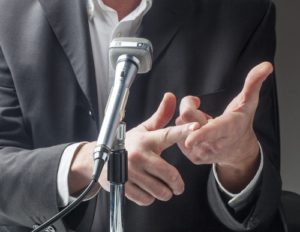Radio Interviews: What Physicians Can Learn From Politics
 Early in his journalism career, a professional colleague worked as a field reporter for a top-rated radio station. On any given day, his assignments could range from (boring) City Council sessions to catastrophic five-alarm fires.
Early in his journalism career, a professional colleague worked as a field reporter for a top-rated radio station. On any given day, his assignments could range from (boring) City Council sessions to catastrophic five-alarm fires.
Some of the most interesting and challenging journalism sprang from the opportunity to report on issues and candidates in the run-up to any election. Local, state or national, it was always interesting to study how seasoned candidates (and some aspiring first-timers) would handle interview sessions with the news media.
Some observers would say the current national election cycle has been, shall we say, “more spirited” than previous presidential campaigns. And, regardless of your political point of view, all the individuals who have been in the running have mastered effective techniques for handling news media interviews.
Politics is crazy. And be it television, radio, print or the new digital media, political candidates have a ton of daily practice. More importantly, they know that the news media is their main conduit to reaching and influencing prospective voters (their target audience), more so than the daily whistle-stop rallies and “stump speeches.”
From time to time, physicians, hospital administrators, marketing and communications professionals are called upon to speak to the media…about something. Admittedly, the radio interviews in healthcare are rarely as huge as the inescapable media coverage of our nation’s political process. But doctors can learn a lot from watching the politicians in action.
Our journalism/reporter colleague offers the following advice for an effective radio interview. For that matter, most of these concepts are useful for all types of media.
Study the pros. Disconnect from the pro-or-con passions of the issue and examine how politicians interact with reporters and handle media questions. They are seldom flustered or caught off-guard. They appear to be well spoken, and they deliver a clear, concise, and (hopefully) convincing response. They practice daily.
Prepare. Practice. Rehearse. Politicians anticipate both the questions and the answers. If it appears effortless, spontaneous and articulate, it’s because they are prepared and experienced. Responses are often tailored to fit a concise “sound bite.”
Get acquainted with the reporter or interviewer in advance. Reporters have their own sense of “professional distance” and independence. But in many situations, a doctor or spokesman can talk with the reporter—“before we begin”—to break the ice and understand the topics to be discussed. Both sides of the microphone will deliver a better product.
Speak to be understood. Many experts don’t know how to clearly communicate complex subjects. It’s a challenge to keep from explaining in too much detail. Focus on the highlights that are the most important to the audience and use the words that allow them to can grasp core ideas quickly.
Memorize your talking points. Media interviews have an agenda. Both the reporter or interviewer and the guest or interviewee have a purpose or premise for sitting down in front of a microphone. Be clear about what you want to achieve, say or promote, and have a list of the key points that you want to speak to in the interview.
Be prepared to guide the interview or change the subject. Conversations can wander off-topic or even into unfriendly territory. It may be necessary for you—the interviewee—to pull things back on track. (Politicians are masters of smoothly changing the subject.) You might say: “Something I’m sure our audience would like to know about is…” or perhaps, “Another thing that’s important to mention today is…”
Be confident and be interesting. Your purpose is to inform or educate the audience. The interviewers purpose is to deliver interesting or entertaining content that keeps listeners listening. Those two purposes are served by information that is useful. Know your material and bring out the benefits that appeal to the listening audience. Practice speaking clearly, confidently and authoritatively.
One final idea…
Like public speaking, media interviews can be uncomfortable. Whenever possible, record the interview for your personal and private playback. Ask a trusted colleague join you in making a constructive critique. There’s always room for improvement.








